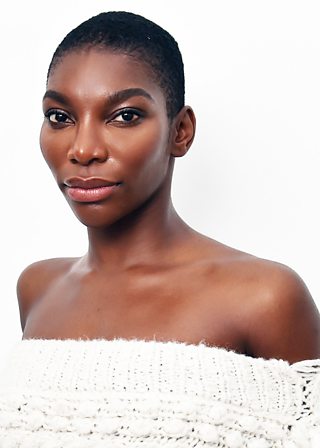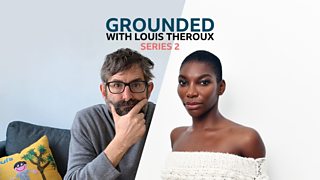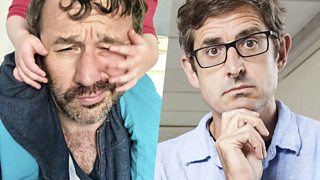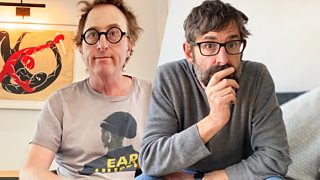Michaela Coel: Eight things we learned when she spoke to Louis Theroux
Louis Theroux is back for a second series of his Grounded podcast, getting personal with a host of fascinating guests. For his first show, Louis speaks to Michaela Coel, BAFTA winner and creator/star of the critically lauded I May Destroy You.
Here are eight things we learned from their conversation. Please be aware that the interview contains discussion of sexual assault.

1. Michaela was worried I May Destroy You would be poorly received in 2020

We look at the actions of somebody else and based on our experiences, we see it a certain way. Depending on our trauma, we deem the person bad, good, right, wrong.Michaela Coel
I May Destroy You received rave reviews everywhere it was broadcast, but Michaela was concerned a story about sexual assault and the sometimes-blurry edges of consent may not go down well amid a pandemic. “I thought I knew the general vibe of the world in 2019,” she tells Louis. “So I was OK with putting out the work. Then the world took a turn and it was super crazy. I thought, ‘Oh, actually, was this a good idea?’” However, she realised that this was a show that was always going to shake people up. “I've come to understand that… some people were ready and willing to receive the show and the content. Not everybody is going to be, but not everybody is ever going to be. If they are, maybe I've made the wrong show.”
2. She thinks we need more gentleness in public discussion
Michaela is not afraid to ask confronting questions in her work. She welcomes discussion of difficult topics. But she thinks there is a lack of “gentleness” in the way some people speak to those they disagree with. “For these people who feel like they are victims of a clampdown against free speech, I think having empathy for the people they’re talking about is quite useful to understand why other ‘groups’ might feel threatened,” she says. “Look at their lives – really look – and then speak from thinking about that, rather than about your free speech. I think there’s a gentleness missing from that camp of white men. Just to remember, this person is black, and that, sociologically, comes with so many difficulties. Or this person is from the trans community.” She says acknowledging mistakes is something she does herself often. “I really mess up all the time, not thinking about where people are coming from… It’s a daily challenge.”
3. She became a Christian at 18
When Michaela was young, she used to attend church, but said she only knew how to seem Christian. “I’d learnt the cultural habits and how to appear a certain way,” she says. “I know when it’s time to say hallelujah, amen, brother, praise be.” Then someone came to her and said they had a message from God that, “You have done all the outside things, but you haven't got to know him for yourself on the inside.” She prayed on it and says she developed a deeper feeling of belief in God. “Everything was so clear. And that was glorious.”
4. She’s no longer Christian
Michaela says she no longer believes in God. She says some parts of religious belief are “great”, but that, “it comes with a complete disconnection from the reality in which we sit in the world and the reality of science, which is more real, for me. It’s difficult because life is so uncertain… but I’m more OK with the uncertainty than with the complete delusion. There’s a ceiling on the growth. In real life, I can discover things and read and learn and find out I was wrong about what I thought before… You can’t really do that with Christianity.”
5. Writing helps her process emotions
Michaela started writing I May Destroy You after she was sexually assaulted. She says that writing something that explores what she went through helped her to understand her feelings. “Something like that happens, that really does rock your world and shift you off your axis,” she says. “I had developed a kind of certainty about how the world was and then it took it away again. When something like that happens, maybe habitually I want to write about it.” In writing, she says she started to think more broadly about consent. “There are so many ways that this theft of consent happens. Sometimes it’s like a magic trick and it leaves the person thinking, ‘How did that happen?’… I wanted to explore that, maybe in the hope I might grow past or through some of the damage.”
6. She’s looking to ask questions, not provide answers
When Louis asks Michaela about what she’s saying in some of the scenes in the show, she pushes back. “It’s not that I’m saying this is good and this is bad… I don’t have those labels,” she says. “What I think is really interesting is how we look at the actions of somebody else and based on our experiences, we see it a certain way. Depending on our trauma, we deem the person bad, good, right, wrong.” She hopes people watching the show take time to consider how they feel. “When you really watch it and you just sit down and stop using your gut reaction, you realise you don’t have an easy opinion. There isn’t any right or wrong.”
7. She changed her email address to escape the attention
I Will Destroy You has made Michaela incredibly well-known and in-demand. She says she’s had to change her email address to get away from the constant messages. “It was too much,” she says. “I like writing stories and filming them. I love to act in projects I really believe in… I’m not too interested in being caught up in the euphoria of being, ‘hot right now’… I’m not very good with flattery and gifts and feeling like I’m popular.” If you email her currently you will be redirected to her assistant, “my angel.”
8. She’s grieving the end of I Will Destroy You
Michaela is currently in what she describes as, “post-writum depression.” She says the experience of making I Will Destroy You was so all-consuming that she feels lost without it. “It becomes the centre of your world and then, boom, it’s gone. And there’s nothing. I would work 16-hour days without realising what I was doing. Now there’s a gaping hole where that work once was.” She says she’s not rushing into her next project until she’s processed. “I’m going to sit in it and I’m going to grieve… I walk for two hours in the morning, I run in the morning, I meditate, I see my friends, I see my family. All the things I neglect when I’m working a lot. When that process is done, I’ll begin to think a little bit more about opportunities.”
More from Grounded with Louis Theroux
-
![]()
Grounded with Louis Theroux: Michaela Coel
Louis speaks to actor and writer Michaela Coel.
-
![]()
Chris O鈥橠owd: Nine things we learned when he spoke to Louis Theroux
Louis speaks to actor and comedian Chris O鈥橠owd.
-
![]()
Rose McGowan: 10 things we learned when she spoke to Louis Theroux
The actor, activist, filmmaker and musician on cults, dogs and Weinstein.
-
![]()
Nine things we learned when Louis Theroux interviewed Jon Ronson
The rival documentary makers discuss conspiracy theorists and surviving lockdown.




